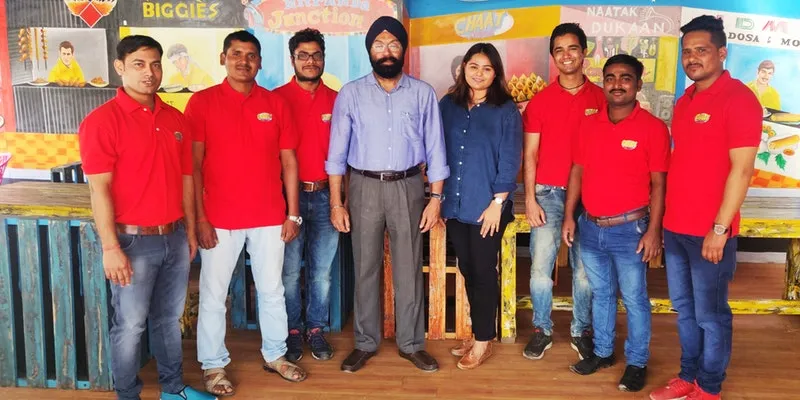Her love for street food made this PhD scholar build a Rs 5 Cr food brand
Bengaluru-based Mireya Foods, the parent company of Chaat Street, was setup to serve authentic chaats from every part of the country, and gives an option to customise chaats as well.
For many of us, chaats are associated with nostalgia and fun. Whether it’s the old street corner where you used to get the best gol gappas, or the hole in the wall restaurant that makes the best pav bhaji, each city and region has its own famous food joints.
This was something Aakanksha Chaudhary would often miss – her love for spicy and tangy Indian food. After completing her doctorate in Material Sciences from IISc, Bengaluru, Aakanksha was all set to get into research. However, not finding a suitable job profile in the market forced her to change tracks. Being upset by the turn of events along with the desire to do something of her own, Aakanksha decided to look at something she loved - food.
A foodie by heart and an avid cook herself, she made up her mind to switch fields from academics to hospitality. She setup Mireya Foods, under the brand name Chaat Street, in 2017 in Bengaluru. . The platform offers chaats like Bhel Puri, Paani Puri, and others.
From earnings of Rs 100 on their first day, the brand is now seeing a revenue of Rs 5 crore. It has seven stores and one central kitchen in Bengaluru at present, and has an annual turnover of Rs 5 crore. The store’s EBITDA is pegged at 25 percent.

Team at Chaat Street
Why Chaats?
Explaining the reasons that made her start up, she says, “Traditionally, chaats are treated as an accompaniment to meals and are sold in big sweet shops as part of the menu. However, we quickly realised this was a category waiting to explode. People love Indian food, but are served burgers-pizzas-coffee by multinational companies. Additionally, with changing lifestyles, people are choosing to eat light meals more frequently during the day as well. This has resulted in a huge demand for Indian snacks offered in smaller portions along the day.”
However, one of the biggest challenges Aakanksha faced was the inflated costs of raw materials, and setting up of the store. She found it more difficult as she had bootstrapped her business by taking money from friends and family.
Bootstrapping the way
Aakanksha decided to team up with people she knew had the same passion and love for food and cooking, but were untrained or unemployed.
“Approximately 70 percent of our staff were untrained and unemployed earlier, but had great motivation to learn and make a livelihood for themselves. Giving them an opportunity to a brighter future is our way of giving back to society. Many of these employees, despite no formal training or degree, head many important verticals in the company today,” says Aakanksha.
Apart from that, to ensure they kept the costs low, Aakanksha decided to use digital platforms as well for selling. The team also sells from its website and has also tied up with foodtech players such as Swiggy and Zomato for greater reach.
Using technology effectively
“We use data analytics to understand consumer behaviour, which has resulted in our unique offering such as “Make-your-own-Chaat”, which came about from the fact that chaat has different interpretations across the country, and people prefer to have it in their home style,” says Aakanksha.
She adds that they track feedback from the delivery aggregators and on social media to give a better experience.
“Internally, we use tech to launch new products with better shelf life. We use state-of-the-art logistics software to manage our supply chain and reduce wastages and pilferage, a common pain point in this industry. We also use the latest tech such as face recognition and other biometrics for HRMS to improve employee utilisation. This has also resulted in reduced attrition rates with better employee engagement, something the restaurant industry is plagued with,” adds Aakanksha.
Building the team
Talking about building the core team, she says, she roped in Anmoalak Singh Bhalla as the COO, who has 39 years of experience in end-to-end business development; and has led diverse teams before.
She also roped in Tapan Kumar, an IIM Ahmedabad alumnus, as a financial advisor. He specialises in setting up retail chains, ecommerce, finance and accounts, and IPO management.
Speaking of the market opportunity, Aakanksha adds, “Just in the top 10 cities of India, the opportunity size for fast-food is approximately Rs 500 crore, and is growing at an estimated rate of 11 percent Y-o-Y. Chaat Street focuses on serving authentic chaats from every part of the country, and gives an option to customise chaats the way a customer likes it.”
Future plans
From the spicy sev puri at Khao Galli to Chaat Bhandar at Chandni Chowk, people in Bengaluru crave for good chaats, says Aakanksha.
The team believes that their product line up having demand in high footfall commercial zones is huge as the ticket size is low, and it is an impulsive buy. At the same time, they are also doing a major portion of sales online in Bengaluru due to their tailored combo meals, which has received good response from customers.
“When I started my business, people questioned my choice of domain and what was a highly-educated person doing in a traditional field like this. But I was strong headed in my dream of making this business a success and a professionally run venture, and I am still working towards my goal,” says Aakanksha.
She adds that the team is in the process of doubling their store count, and will soon be entering Pune. They are also looking to expand their presence in four other cities.
“We expect to continue to set up both offline stores and kitchens to serve the demand. We are also exploring the opportunity to enter corporate food courts in IT parks as a brand building exercise,” says Aakanksha.
(Edited by Megha Reddy)









